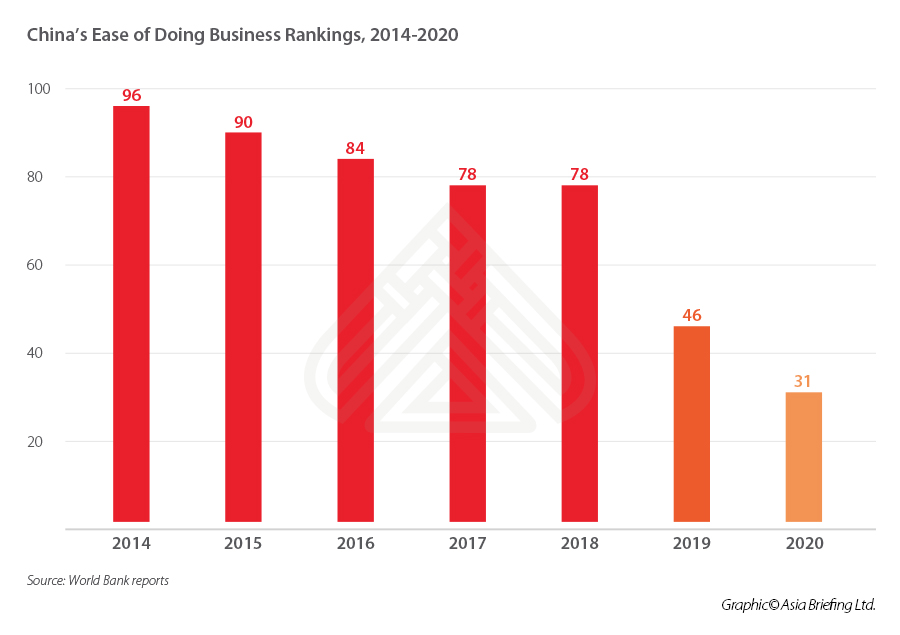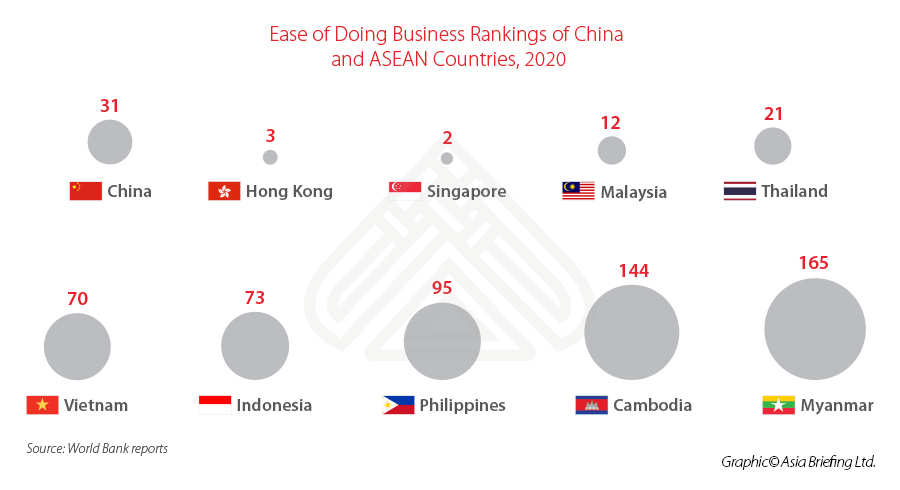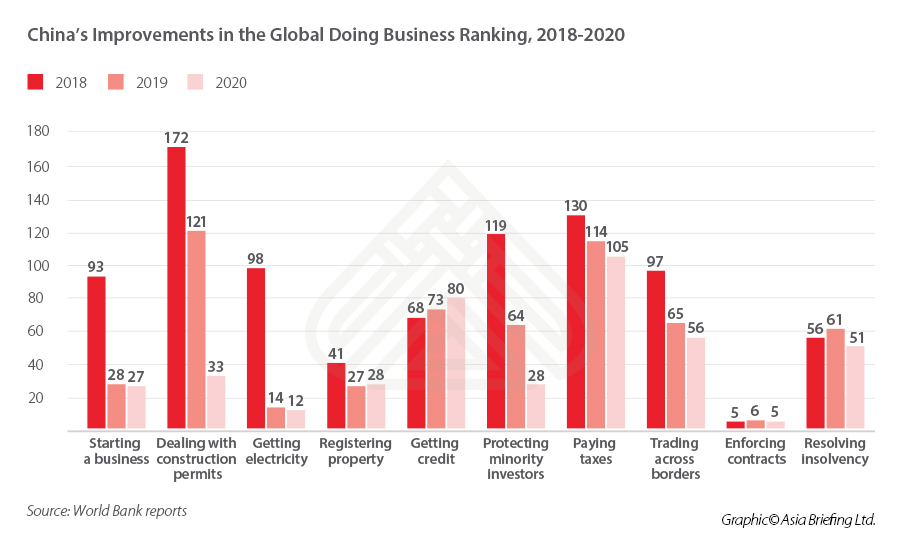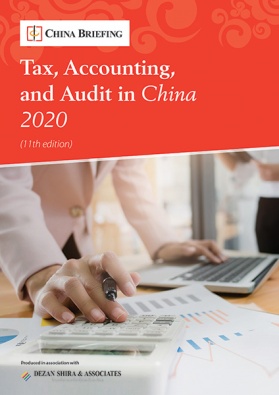China’s Business Reforms are Yielding Success: World Bank Report
On July 27, 2020, the World Bank released a report analyzing China’s measures on business reforms – China’s Doing Business Success: Divers of Reforms and Opportunities for the Future.
The report notes that China’s recent acceleration in business reform has yielded success – over the past two years, it has moved from ranking 78th to 31st on the World Bank’s Ease of Doing Business rankings.
China also features among the top 10 economies with the biggest improvement in business environment for two years in a row.
How to read China’s ranking on the Ease of Doing Business index
Currently, China’s ranking on the ‘Ease of Doing Business’ index follows Singapore (2), Hong Kong (3), Malaysia (12), and Thailand (21).
Since 2003, the World Bank has been releasing its Doing Business report annually.
The 2020 version of the Doing Business report covered 190 economies and 12 indicators, 10 of which were included in the Ease of Doing Business score and ranking, indicating the complexity for small and medium-sized enterprises (SMEs) to do business in the country.
In China, the World Bank’s assessment looks at two of its most developed cities, Beijing and Shanghai, for its data acquisition.
Among the 10 indicators – starting a business, dealing with construction permits, getting electricity, registering property, getting credit, protecting minority investors, paying taxes, trading across borders, enforcing contracts, and resolving insolvency – China’s far-reaching reforms have placed it close to or at the forefront of the global best practice in several areas.
In getting electricity, China is now positioned 12th worldwide, with only two steps to get a commercial electricity connection. It now only costs 32 days to obtain a power connection in China, compared to half the East Asia and Pacific average of 63 days. China made it easier to get electricity connections in Beijing and Shanghai by expanding their network capacity, simplifying power connection applications, introducing mobile apps to simplify administration, and making electricity tariffs more transparent.
In addition, China maintains its leading position in enforcing contracts, ranked 5th worldwide, and achieved great improvement in dealing with construction permits (from 172nd to 33rd), protecting minority investors (from 119th to 28th), and starting a business (from 93rd to 27th).
In 2017, China launched online company registration and simplified social security registration in Beijing and Shanghai, as well as implemented a simplified company deregistration procedure nationwide.
The completion of the five-in-one business license reform and the introduction of policies like “One Window, One Form” created a simplified digital channel to register a business, and as a result, dramatically cutting the days needed for starting a company from 22.9 days to 8.5 days.
In the years between 2017 to 2019, China also made dealing with construction permits easier by simplifying the approval for low-risk projects, quickening service for obtaining water and drainage connections, and increasing safety by imposing stricter qualification requirements for specific professionals. This has reduced the total time to obtain building permits in Shanghai from 169.5 days to 125.5 days and Beijing from 136.5 days to 93 days.
However, the country still lags behind other advanced economies in some areas, such as paying taxes, getting credit, cross-border trade, and resolving insolvency – ranking 105th, 80th, 56th and 51st in the respective categories worldwide.
China’s tax system still remains complex for most foreign investors, although in the last two years it has reduced taxes and fees on a larger scale. Statistics show that the total tax and fee cuts in 2019 amounted to more than RMB 2 trillion (US$430 billion), around two percent of the GDP. From January 1, 2019, China implemented specific additional deductions for individual income tax (IIT). From April 1, 2019, a series of value-added tax (VAT) reform policies were introduced, lowering VAT rates to 13, 9, and 6 percent. A series of inclusive rules on tax and fee cuts for small and marginal-profit enterprises and small and micro firms have also been launched.
What is China’s track record on business reforms?
In 2015, the Chinese government launched a national reform initiative (“Fang Guan Fu” reforms) to delegate power, streamline administration, and optimize government services, which laid down the foundations of later reforms. In 2017, the country’s business environment reform agenda was reinvigorated, following a closer collaboration with the World Bank.
From 2018 to 2020, China continued implementing significant business reforms at the national level. Here are a few examples:
- At the end of 2018, China started to implement a unified negative list system for market access across the country, allowing all types of market players to enter industries, fields, and businesses outside of the negative list on an equal footing in accordance with the law.
- In March 15, 2019, the Second Session of the 13th National People’s Congress voted to adopt the first Foreign Investment Law in China.
- In July 1, 2019, the Government Investment Regulation went into effect, bringing government investment in line with the rule of law.
- In June 23, 2020, China rolled out two 2020 negative lists for foreign investment, reducing the number of items from 40 to 33 on the national negative list and 37 to 30 on the free trade zone negative list.
To be noted, the World Bank’s Doing Business rankings for China is measured based on the business environments in two of China’s wealthiest cities and both are directly controlled by the central government. The interpretation and implementation of policies in China can vary widely based on region, and a foreign investor might find that the business environment in a smaller provincial city is significantly different and less accessible.
According to a business environment report on Chinese cities released by China’s CCTV, the country’s biggest central TV station, in June: Beijing, Shanghai, Shenzhen, Guangzhou, Chongqing, Nanjing, Hangzhou, Chengdu, Tianjin, and Ningbo are the top ten cities with the best business environment in China.
However, the World Bank’s report also said that “despite the recent reforms (in China), there is still a large unfinished reform agenda focused on strengthening the rule of law, promoting competition and ensuring a level-playing field for all companies, including private and foreign-owned companies”.
Data sharing among various government institutions remains a major challenge; surveys on private enterprises’ feedback on the business environment are scattered and there is no clear feedback mechanism within the government; and finally, the implementation of business environment reform policies requires further improvement of the existing legal system. For example, current legislation makes it difficult to implement electronic licenses, electronic seals, and electronic signatures, or to implement joint approval of firm investment projects.
Regardless, China is committed to improving its domestic business environment to lure more foreign investment, especially give recent tensions in the international trading environment.
On January 1, 2020, the State Council’s Decree on the Optimization of Business Environment (Decree No. No.722 of the State Council) was officially implemented, which specified the key principles and directions for fostering a stable, fair, transparent, and predictable business environment and detailed efforts on cutting red tape, streamlining administrative approval, and improving supervision and administrative law enforcement. The Decree also included specific reform guidance on the Doing Business parameters and a set of good reform principles based on international best practices.
Earlier this month, on July 12, the State Council released the Implementation Opinions about Further Optimizing Business Environment and Better Serving Market Entities (Guo Fa Ban [2020] No.24) in a policy move to further reduce restrictions on foreign companies’ and trade companies’ investment and business activities. This policy is now in force since July 15.
China Briefing will continue to publish updates on China’s business reforms. For practical advice and more relevant information on how China’s policies may apply to your operations in the region, please email us at China@dezshira.com.
About Us
China Briefing is written and produced by Dezan Shira & Associates. The practice assists foreign investors into China and has done so since 1992 through offices in Beijing, Tianjin, Dalian, Qingdao, Shanghai, Hangzhou, Ningbo, Suzhou, Guangzhou, Dongguan, Zhongshan, Shenzhen, and Hong Kong.
Please contact the firm for assistance in China at china@dezshira.com. We also maintain offices assisting foreign investors in Vietnam, Indonesia, Singapore, The Philippines, Malaysia, Thailand, United States, and Italy, in addition to our practices in India and Russia and our trade research facilities along the Belt & Road Initiative.
- Previous Article How the Tax System is Organized in China
- Next Article China’s Healthcare Industry – Opportunities in Telemedicine and Digital Healthcare









